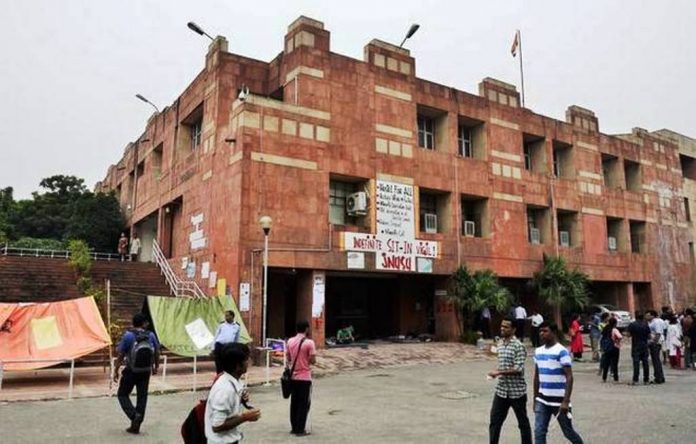By Abhay Kumar for TwoCircles.net
The JNU administration has recently issued a circular, imposing “compulsory” attendance on “all regular registered students” from the winter semester. Not to talk of graduate and post-graduate students, even the research scholars have not been spared. If the research scholars are forced to mark their attendance every day, when will they do fieldwork? Or when will they visit archives and libraries outside? Talks are also rife that a proper biometric time and attendance system is to be put in place for teachers as well. The draconian measures do not spare anyone.
JNU students rightly fear the plan, if implemented, will further destroy JNU’s character as a critical space and create inconveniences. Who would deny that critical thinking does not take place under the shadow of surveillance and censorship?
Ever since the Hindutva forces came to power in 2014, they have carried out their agenda to destroy JNU. They hate JNU because it provides spaces for critical thinking. Their opposition has to do with JNU’s secular and progressive character.
The dictatorial policies and anti-student measures–being taken by the JNU Vice Chancellor Jagadeesh Kumar–should be seen in this context. In the past, he invited the police to arrest his own student leader, cut scholarships and drastically reduced the intake of seats for research courses, appealed to the government to install war-tank to “instill” a feeling of nationalism among students and now he has issued the circular.
These all draconian measures are being justified in the name of “nationalizing” JNU. The so-called “nationalist” Vice-Chancellor often forget what our national poet Tagore has dreamed of a free-India: “where the mind is without fear” and “knowledge is free”. But the reign of Vice-Chancellor has so far promoted the feelings of fear and state of unfreedom. He is working in the direction of destroying JNU’s critical space and its inclusive and diverse composition.
For many, JNU’s beauty lies in its imposing red buildings and the sprawling green campus that sits on the Aravalli hill. But for me, the real beauty lies in its culture of debate and discussion. The real learning often takes place outside classrooms. The space outside classrooms such as dhabas, canteens, protest sites as well as hostels is the real place of learning. It has to do with the structure of power and hierarchy present in the classroom. The spaces outside classroom are relatively free and more conducive for ideas to be exchanged. These examples are given to argue that the measures of control (compulsory attendance) do not promote critical thinking and dialogue.
Though the Vice-Chancellor has a science background but he does not seem to apply it before introducing any measure. If he thinks attendance would facilitate better research, I invite him to come out with facts. Can he show any scientific study to prove that the introduction of compulsory attendance has improved the quality of research anywhere in the world? Does attendance in the classrooms contribute in any significant way to making students more interested in subject? When the world is talking about open-learning and free access to knowledge, our Vice-Chancellor is running in opposite direction.
The Vice-Chancellor should know that JNU professors like Neeladri Bhattacharya, Avijit Pathak, Utsa Patnaik, Prabhat Patnaik, Gopal Guru, Nivedita Menon and others were so popular among students that their classes were always packed. Even before I made it to JNU, I had heard about them. My seniors at Jamia Millia Islamia used to attend their lectures. We have always seen our teachers, entering the classroom with notes and books in their hands but the JNU Vice-Chancellor is ready to snatch them. The books are being replaced with the attendance-sheet! This move is so unpopular among students that even the ABVP, the RSS student-wing, have brought a pamphlet to condemn it.
The students at JNU have always been encouraged to take course from different schools and centres. On several occasions, they end up attending more courses than required numbers. They know that one discipline is incomplete without the other. Teachers, on their parts, keep their classes open for all and take extra classes to complete the courses. They all work because they value the importance of knowledge and research. They have been doing all these in absence of compulsory attendance.
The increasing role of administration in the functioning of a university is also a matter of concern. Educationists are of the opinion that the administration’s role should be minimal inside the university. But ever since the Vice-Chancellor has come to JNU, its role has been maximized beyond all limits. These measures may please his political masters and fetch him some personal rewards but in long run, the institution would become ruined.
At the end, let me reiterate that that the real agenda behind these measures has nothing to do with improving research and better work. They are designed to put a check on “political activity” and to keep swords hanging over students’ heads, particulary activists’, all the time. Compulsory attendance strikes a fatal blow to JNU and the idea of university. Shouldn’t we forge a much larger solidarity to oppose it now?
(The author is pursuing PhD at Centre for Historical Studies, Jawaharlal Nehru University, New Delhi)


